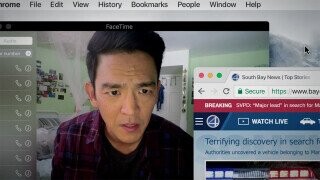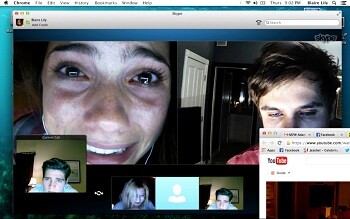Horror Movies' Monster For The 2020s: Videoconferencing

If there's any silver lining to living through a global plague that has claimed millions of victims, created bleach-drinking cults, and caused people to try to kill each other over 2-ply toilet paper, you'd think it'd be a bunch of great, socially poignant horror movies. In the '50s, the sinister Cold War witch hunts us Invasion of the Body Snatchers. In the late '90s, the unstoppable outbreaks of Mad Cow Disease and Ebola during the late '90s inspired 28 Days Later to resurrect zombie horror. And who could forget 2018's Get Out, which delved into the psychological nightmare of one of the more subtle tragedies of American race relations: that rich white liberals weren't able to vote for Obama a third time.

Yet so far, the crop of Covid-inspired horror movies has been lackluster cash grabs at best and, at worst, Corona, The Movie. The reason for this isn't that the pandemic isn't prime fodder for horror fads; it's that these filmmakers are focussing on the wrong element. For most filmgoers, the true horror of the 2020 pandemic didn't involve watching loved ones die or fighting for their lives strapped to a ventilator, but the haunting realization that there's now nothing more to life than staring at your laptop for 14 hours a day at home while trying to join Zoom meetings.
Appropriately morbid, Russian horror director and producer Timur Bekmambetov must've thanked his lucky stars when the lockdowns started to hit. Not only is a pandemic booming business for horror movies (humans are weird like that) since the mid-2010s, Bekmambetov has been pioneering an unconventional filmmaking technique called Screenlife. The premise of this subgenre is simple: What if the silver screen was just a computer screen? In Screenlife, the entire film takes place exclusively on computer and smartphone desktops. The only time actors are on the screen is if they are literally on the screen via video call, otherwise only appearing as disembodied mouse clicks, emails, and search engine queries.

While Bekmambetov previously hadn't had much luck fanning interest for movies that are just 100 uninterrupted minutes of people awkwardly staring two inches below a laptop camera while slowly losing the will to live. But now that most of us just call that "Tuesday," major Hollywood studios have been banging down the director's Google Hangout invites to sit down with the filmmaker they believe can draw in the billions of white-collar workers who have been rapidly mutated into Very Online People -- their watercooler minds unable to cope with the tension headaches, awkwardly overlapping video conversations and the endless anxiety of checking your phone and seeing you have 142 unread WhatsApp messages.
And they're very reassured by Bekmambetov's proven track record with movies like 'slasher on social' Unfriended, online radicalization thriller Profile, and the John Cho vehicle Searching, the incredibly tense thriller of a dad trying to find clues about his daughter's disappearance by scouring her laptop, hoping the next hidden folder he clicks open won't be the one that contains all of her nudes.
All of these Screenlife movies have already proven that the technique is good at capturing that special kind of tense, overwhelming isolation every person has felt staring at a laptop with 32 open tabs at two in the morning. But Bekmambetov wants to make clear that Screenlife isn't just some movie gimmick like shaky cam or, god forbid, Hollywood's continued attempts to make POV movies a thing. Instead, he believes there's an entirely new cinematic language that can be created around how people interact with and react to their screens. Can you make audiences hold their breath when a cursor shakily moves to a sinister link like they do when they see Shelley Duvall's hand slowly reaching for the doorknob to Jack Nicholson's lair? Can a desktop be arranged in a way to be cinematically poignant, every empty "New Folder" and old McAffee shortcut revealing subtle clues to our hero's inner struggle?
Whether this new genre will unlock a new mise-en-screen remains to be seen. If not, at least their horror movies are still scratching an important itch for all use work-at-homers: a chance to switch off, lie on the couch and watch other people having panic attacks over a spotty FaceTime call for a change.
For more exclusive screen time with Cedric, do follow him on Twitter.
Top Image: Sony Pictures Releasing